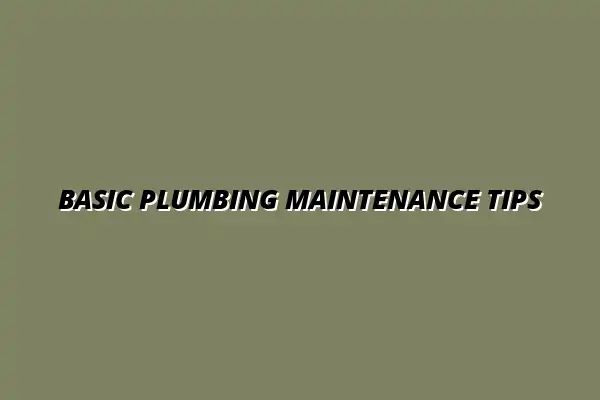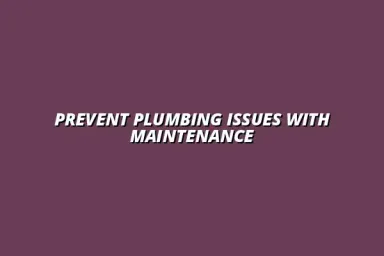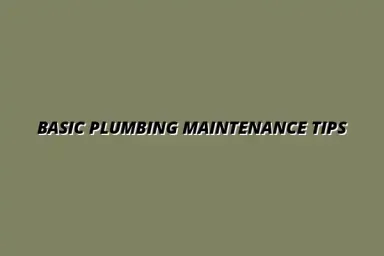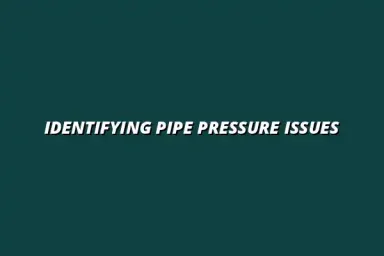Understanding the Importance of Basic Plumbing Maintenance for Longevity
Taking care of your plumbing system is crucial for the overall health of your home. Regular plumbing maintenance helps prevent serious problems that can lead to costly repairs and disruptions. It’s not just about fixing issues as they arise; it’s about ensuring that everything runs smoothly for years to come!
By understanding the importance of basic plumbing maintenance, homeowners can save money and avoid unnecessary stress. Routine checks can catch small problems before they escalate, which is a win-win for everyone involved. Let’s dive deeper into why regular plumbing maintenance is essential and what happens when we neglect it! For a comprehensive checklist to guide your efforts, check out this helpful homeowners plumbing maintenance checklist.
Why Regular Plumbing Maintenance is Essential for Homeowners
Regular plumbing maintenance is like a health check-up for your home. It allows you to identify potential issues before they become bigger problems. Some key reasons to keep up with maintenance include:
- Preventing Water Damage: Small leaks can lead to significant water damage over time.
- Improving Efficiency: Well-maintained plumbing systems work better, saving you money on water bills.
- Extending Lifespan: Regular care can help your plumbing fixtures last much longer.
When you prioritize maintenance, you’re investing in the longevity of your entire plumbing system. Plus, it helps keep your home safe from potential hazards like mold and mildew caused by unchecked leaks! For example, keeping your kitchen plumbing in top shape is vital. Learn more about essential kitchen plumbing maintenance tips.
Common Plumbing Issues Caused by Neglect
Neglecting plumbing maintenance can lead to various issues that may surprise many homeowners. Some common problems include:
- Clogs: Build-up in pipes can cause slow drainage and unexpected blockages.
- Leaky Faucets: A simple drip can waste gallons of water and increase your bill.
- Running Toilets: This can happen due to worn-out flappers or faulty components.
These issues often start small but can escalate quickly if left unattended. By addressing them through regular maintenance, you can avoid costly repairs and keep your plumbing system in tip-top shape! Regular drain inspections are crucial, and you can find valuable information on annual drain inspection and cleaning.
Essential Tools and Supplies for Basic Plumbing Maintenance
Having the right tools and supplies on hand is essential for effective plumbing maintenance. Not only does it make the tasks easier, but it also ensures that you're prepared for any minor repairs or adjustments. Let’s take a look at the basic plumbing tools every homeowner should have!
Basic Plumbing Tools Every Homeowner Should Have
Equipping yourself with the right tools can make plumbing maintenance much easier and more efficient. Here’s a list of essential plumbing tools that every homeowner should consider:
- Wrench: Useful for tightening or loosening nuts and bolts.
- Plunger: A must-have for clearing minor clogs in toilets and sinks.
- Pipe Cleaner: Helps keep pipes clear of build-up and debris.
These tools not only help with immediate plumbing needs but can also be a lifesaver during emergencies. Having them readily available means you're ready to tackle any minor plumbing issue that arises! Addressing plumbing issues promptly can save you significant headaches down the line. For more information on essential solutions, visit our guide on essential plumbing maintenance for homes.
Wrenches, Plungers, and Pipe Cleaners
Let’s dive a bit deeper into why these specific tools are so important:
- Wrenches: Consider having both adjustable and fixed wrenches to accommodate various sizes of fittings.
- Plungers: Invest in both a cup plunger for sinks and a flange plunger for toilets.
- Pipe Cleaners: Consider using a flexible drain snake for more stubborn clogs.
Having a well-stocked toolbox is crucial for any homeowner looking to keep their plumbing running smoothly. You never know when a simple fix might turn into a DIY project! Proper bathroom maintenance is also crucial, so check out these essential bathroom plumbing maintenance tips.
Safety Gear for Plumbing Maintenance
Safety should always be a priority when performing plumbing maintenance. Here are some essential safety gear items to consider:
- Gloves: Protects your hands from dirt and harsh chemicals.
- Goggles: Keeps your eyes safe from splashes during repairs.
- Face Mask: Useful when working with chemicals or cleaning products.
By wearing the proper safety gear, you can prevent injuries and accidents while maintaining your plumbing system. Remember, it’s always better to be safe than sorry!
Supplies Needed for Routine Maintenance
In addition to tools, having the right supplies for routine maintenance is essential for effective plumbing care. Below is a list of necessary supplies that can help you stay on top of your plumbing needs:
- Sealants: To stop leaks in pipes and fixtures.
- Tapes: Useful for securing fittings and preventing leaks.
- Cleaners: Regular cleaning products can help maintain drain and fixture hygiene.
These supplies are fundamental for tackling everyday plumbing tasks and keeping your system in check. Investing in quality products can save you a lot of time and effort in the long run! Don't forget the importance of regular water heater maintenance; find helpful advice on essential water heater maintenance tips.
Choosing Eco-Friendly Products for Plumbing Care
Being environmentally conscious is a great practice, even in plumbing maintenance. Consider these eco-friendly options:
- Biodegradable Cleaners: Effective and gentle on the environment.
- Natural Sealants: Safe for both your plumbing and the planet.
- Reusable Cleaning Tools: Minimizes waste while still doing a great job.
By opting for eco-friendly products, you not only protect your plumbing but also contribute to a healthier planet. It’s a win-win for your home and the environment!
Addressing Common Plumbing Maintenance Questions
As a homeowner, you might have a lot of questions regarding plumbing maintenance. Understanding the frequency and signs that indicate when it's time to take action can save you a lot of trouble. In this section, we'll explore these common questions to help you stay ahead of plumbing issues. For expert help in Birmingham, consider contacting a plumber in Edgbaston, Birmingham.
How Often Should Basic Plumbing Maintenance Be Performed?
Timing is everything when it comes to plumbing maintenance! Typically, it's recommended to perform basic plumbing checks at least twice a year. However, some specific tasks might need more frequent attention.
- Inspect faucets and pipes: Every six months
- Flush the water heater: Annually
- Check toilets for leaks: Twice a year
- Clean drains: Monthly
By establishing a routine, you can catch potential issues before they escalate into bigger, expensive repairs. And remember, the more proactive you are, the better your plumbing will perform!
Signs Indicating It's Time for Plumbing Services
Knowing the signs of plumbing issues can help you act quickly! Here are some red flags to watch out for:
- Unusual noises: Gurgling or banging sounds in pipes
- Low water pressure: A sudden drop in pressure can indicate blockages or leaks
- Water discoloration: Rusty or discolored water can suggest pipe corrosion
- Frequent clogs: Regularly clogged drains may point to deeper problems
If you notice any of these signs, it's essential to seek professional help to prevent further damage. Timely intervention can save your home from costly plumbing disasters!
Best Practices for Long-lasting Plumbing Systems
Establishing good practices for plumbing maintenance will keep your system running smoothly. A consistent routine helps in identifying potential problems before they become serious. Let’s dive into how you can develop a maintenance strategy!
Developing a Maintenance Schedule for Your Plumbing
A well-thought-out maintenance schedule is crucial for keeping your plumbing in top shape. Here’s how to create an effective plan:
- List routine checks: Include inspections for leaks and blockages
- Set reminders: Use digital calendars or apps to stay on track
- Keep records: Document completed tasks and issues found
- Adjust as needed: Update the schedule based on the condition of your plumbing
By sticking to this schedule, you can ensure that your plumbing systems are well-maintained and functioning efficiently!
The Benefits of Hiring Professional Plumbing Services
While DIY maintenance is great, sometimes you need the expertise of a professional. Here are some benefits of hiring a plumber:
- Expertise: Professionals have the training to identify complex issues
- Time-saving: They can complete tasks more quickly than most homeowners
- Advanced tools: Access to specialized tools that make jobs easier
- Guaranteed work: Many professionals offer warranties on their services
When it comes to significant plumbing tasks, knowing when to call in the experts can save you time, hassle, and money!
Practical Tips for DIY Plumbing Maintenance
Taking care of minor plumbing tasks yourself can be rewarding! However, knowing when to tackle a job and when to call a professional is key. Here are some tips to help you navigate DIY plumbing.
When to Call a Professional vs. When to DIY
Not every plumbing issue is suitable for DIY fixes. Consider these guidelines:
- DIY: Minor leaks, clogged sinks, or basic faucet repairs
- Call a Professional: Major leaks, issues with sewer lines, or extensive renovations
When in doubt, it’s okay to consult with a plumber to avoid making the situation worse. They can provide valuable insights and recommendations!
Budgeting for Plumbing Maintenance: Costs and Considerations
Budgeting for plumbing maintenance can help you avoid unexpected expenses in the future! Here’s how to create a reasonable budget:
- Set aside funds: Aim to save 1-3% of your home's value annually for maintenance
- Plan for emergencies: Keep a separate emergency fund for unexpected repairs
- Compare costs: Get estimates from multiple plumbers to find the best deal
By planning your plumbing budget wisely, you’ll feel more prepared for any repair or maintenance needs that arise!
Summarizing Key Maintenance Strategies for Plumbing Longevity
To keep your plumbing system running efficiently, it's helpful to summarize the key strategies we've discussed. Staying organized and proactive will ensure that your home’s plumbing remains in excellent shape!
Creating a Home Maintenance Checklist
A checklist can be a simple yet effective way to keep your plumbing tasks in order. Here’s a basic outline to get you started:
- Inspect faucets and showerheads for leaks
- Check toilets for running water and flapper issues
- Clean drains with natural solutions regularly
- Flush the water heater annually
Use this checklist to guide your maintenance efforts and ensure you don’t overlook important tasks!
Encouraging Preventive Practices for Long-term Plumbing Care
Encouraging preventive practices in your home is one of the best ways to extend the life of your plumbing. Some ways to promote these habits include:
- Educate family members: Teach everyone about proper plumbing use
- Regularly review maintenance schedules: Adjust as necessary
- Stay informed: Keep up with common plumbing problems and solutions
With a little effort, you can ensure that your plumbing remains reliable for years to come! Being proactive now will save you a lot of hassle later.

 Kiran Almasi
Kiran Almasi

